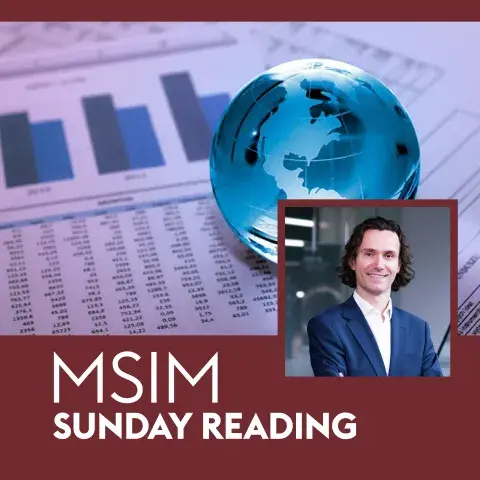
MSIM Sunday Reading is a weekly publication highlighting a current and relevant topic chosen by a professor of the Master of Science in International Management for their courses. The Franklin community gets an inside look at the coursework and specializations offered at MSIM and expert commentary on international issues affecting our world today. This week's MSIM Sunday Reading is in conversation with Bernard Sinnaeve, Adjunct Professor of International Management at Franklin. His article explores how companies must make and implement strategic choices in a fast-changing environment. Doing so requires a high level of skill to manage and build trust across cultures. Organizations that succeed in doing this will reap the benefits of the diversity of thought that comes with their international footprint.
About Professor Bernard Sinnaeve
Professor Sinnaeve is Adjunct Professor of Business and Economics in the MSIM program at Franklin University Switzerland. He is a business professional with over 15 years of experience in the management consulting industry. He spent the first 12 years of his career as a strategy advisor for clients in the banking industry before taking on an internal management role as Chief Operating Officer for Deloitte's consulting business in Switzerland. A firm believer of the need to bring business and academic communities closer together, Sinnaeve has been a lecturer at KU Leuven in Belgium since 2016 (International Management, International Business Strategy), and started teaching at Franklin University in 2022 (Borderless Management, Capstone Course). His key areas of expertise include strategy and business model definition, management and execution, organization design, and the role of culture in the workplace.
In our International Management Course (MGT 510), MSIM students learn why and how companies go international. Starting from a fast changing and increasingly geopolitical context, we review how international companies make strategic “where to play and how to win” choices, focusing particularly on market selection and market entry methods. We also zoom in on how those choices get executed, recognizing the importance of leadership and intercultural management.
A strong believer in the power of stories, I have opted for a non-traditional Sunday Reading, and will be sharing a handful of podcast and streaming tips. Sit back, relax, learn,and enjoy!
- Strategy is about making choices (Roger Martin)
Strategy can seem mystical and mysterious. It isn’t. It is easily defined. It is a set of explicit choices - to do some things and not others – and building a business around those choices. More specifically, strategy is an integrated set of choices focused around where to play and how to win, that uniquely positions the firm in its industry so as to create sustainable advantage and superior value relative to the competition.
To understand the choices international companies make, one has to understand the global context they operate in. With the fall of the Berlin Wall in 1989, it looked like we had embarked on a never-ending spiral of increasing globalization – or the end of history as Francis Fukuyama called it. Increasing resistance from both the left and the right, fueled by radical populism, the pandemic and geo-political conflicts is rapidly changing the course of the global economy. This leads international companies to rethink where and how they operate.
-
Managing across cultures (Erin Meyer)
Managing across cultures is not easy. Even for the most experienced and cosmopolitan managers, it is difficult to fully navigate the complexity of working with people from different cultural backgrounds. Several frameworks exist to help Managers coping with that complexity. In this particular video, we hear from Erin Meyer who developed a tool called the Culture Map. It is made up of eight scales representing the management behaviors where cultural gaps are most common. By comparing the position of one nationality relative to another on each scale, the user can decode how culture influences day-to-day collaboration. On this website, you can learn more about the tool and the challenges that come with applying it. To make this even more digestible, I also highly recommend the eye-opening Netflix documentary American Factory - about the culture clash that arises when a Chinese company reopens a shuttered factory in Ohio.
-
The trusted advisor (Charles Green)
Trusted relationships are vital to the way we do business today. In fact, the level of trust in business relationships, whether internal with employees or colleagues or external with clients and partners, is the greatest determinant of success. The challenge is having a conceptual framework and analytical way of evaluating and understanding trust. Charles Green’s book The Trusted Advisor describes the Trust Equation in detail – what are the elements that will help to build trust, and what are the pitfalls to look out for. An eye opener for anyone working in a professional domain! More information detailing all the elements of the Trust Equation can be found here.
-
Innovation fueled by Diversity (Matthew Syed)
I’d like to finish with one of my favorite podcasts – Sideways, by Matthew Syed. In his episode “Top of the Pops”, Matthew Syed links innovation to collaboration and diversity of thought. He does so by examining the extraordinary career of Max Martin. You might not have heard of Max Martin, but you've definitely heard the songs he's written. You probably know the words whether you like the songs or not. Martin has written many of the world's biggest pop hits. He has 23 number ones, second only to Paul McCartney and John Lennon. Matthew Syed contrasts Martin's songwriting process with the practice of scientific research which has become overwhelmingly collaborative in recent years, and to the vast benefits which can be reaped by introducing diversity in the artistic creation process. A fantastic metaphor for how modern businesses can benefit from their international and multicultural footprint.

